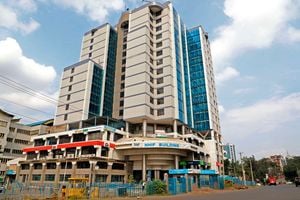
National Health Insurance Fund headquarters in Nairobi.
Top officials of the defunct National Hospital Insurance Fund (NHIF) face fresh investigations over alleged overpayments of more than Sh800 million, under the National Health Scheme Benefit.
The National Assembly's Public Investments Committee on Social Services, Administration and Agriculture has invited the Ethics and Anti-corruption Commission (EACC), to conduct investigations into the roles the officers may have played in the irregular payments.
In a probe report set to be tabled in Parliament, the committee led by Navakholo MP Emmanuel Wangwe has flagged the discrepancies within the defunct NHIF, where Sh828,729,148 was overpaid out of a total expenditure of Sh29.9 billion, under the scheme.
The committee had retreated to write the report, an exercise which it concluded on Saturday.
"This is massive corruption and the committee recommends that the EACC undertakes further investigations, on all the persons who facilitated the overpayment of more than Sh828 million. The EACC should bite hard,” stated Mr Wangwe.
"I want to call on the EACC to investigate the fraudulent claims and ensure that offenders are held accountable within three months. Instances of inflated costs for medical procedures such as C-sections, major surgeries, and overseas treatments were particularly concerning," added the lawmaker.
The committee has recommended investigations aimed at holding accounting officers, board members and staff accountable for the financial irregularities.
Misappropriated funds
The report has proposed measures including recovery of misappropriated funds at the prevailing Central Bank of Kenya lending rates.
The committee’s findings have pointed to systemic weaknesses within NHIF’s processes, which left the fund vulnerable to exploitation.
According to the report, hospitals often manipulated NHIF systems by using single case codes to claim multiple benefits. This was made possible by the lack of integration between notification and pre-authorisation systems.
Some institutions also disguised fictitious claims by consolidating multiple treatment sessions, such as dialysis or chemotherapy, into a single invoice.
The report has also criticised NHIF’s poorly monitored benefit designs, which allowed hospitals to exploit loopholes.
An example mentioned by the committee's chairman was a hospital in Kikuyu Town, that claimed to have performed more C-sections than the country’s largest referral hospital, Kenyatta National Hospital.
The committee has recommended an investigation into NHIF’s systems to determine who facilitated the fraud.
MPs have emphasized initiating legal proceedings through the Directorate of Public Prosecutions (DPP) on culpable officers. The recovery of public funds lost due to overpayments was highlighted as a priority.
Kwanza Constituency MP Ferdinand Wanyonyi underscored the importance of ensuring the committee’s recommendations are implemented without delay.
“We must ensure our proposals are not shelved. This committee must keep tabs on implementation, especially within the specified three-month window,” he said.
His Nandi Hills counterpart Bernard Kitur suggested a split in the National Assembly’s Implementation Committee, to better manage the increasing workload.
“The current committee is overwhelmed, and we risk losing track of critical recommendations. EACC must move with speed and investigate the financial mismanagement and those involved made to face the full force of the law,” said Mr Kitur.
Consequences
Following the revelations and as the committee prepares to table the report before the National Assembly, the spotlight now switches to the EACC and the DPP, as Kenyans wait for their action. The report is expected to have far-reaching consequences for individuals implicated in the misuse of funds.
The parliamentary committee last week embarked on a retreat to finalise the report on various audit queries involving the defunct NHIF and other four key institutions.
The other institutions include the National Social Security Fund (NSSF), the Kenya Marine and Fisheries Research Institute (Kemfri) and the Kenya Broadcasting Corporation (KBC).
The audit queries, spanning the financial years 2013/2014 to 2024, highlight significant taxpayer money lost through corruption, misappropriation, and non-compliance with critical constitutional provisions, particularly Article 225 and the Public Finance Management Act (PFM Act).
“The committee is committed to ensuring that those responsible for violating the law and mismanaging public funds are held accountable. Taxpayers deserve transparency and justice," noted Mr Wangwe.
“We cannot allow corruption and mismanagement to continue unchecked. The report must serve as a turning point for our institutions, and we are determined to see action taken swiftly and decisively," added the MP.
The report now calls for a comprehensive review of internal controls within the newly formed Social Health Authority and the other affected institutions, to prevent future mismanagement of public funds.
It also emphasizes the need to strengthen accountability mechanisms within SHA and other institutions.
The report, once tabled and adopted, is expected to set a precedent in upholding the rule of law and enforcing stringent measures to curb corruption.
By addressing the systemic challenges, the Wangwe-led committee aims to restore public trust and ensure responsible stewardship of public funds.
This is not the first time the NHIF has been on the spot over misappropriation of funds.
In July 2024, the defunct NHIF claimed that it paid Sh368 million in excess claims due to "typing errors" and that it had no proof of where the money went.
In a scandal that exposed leakages within the Fund that has been managing billions of shillings belonging to Kenyans, Auditor General Nancy Gathungu revealed that in the year to June 2023, NHIF paid Sh814.9 million claims, yet hospitals only billed Sh447.12 million through some ten schemes.
The NHIF then blamed the excess payment on typing errors by hospital clerks, but could not provide proof of either having recovered the excess payments or asking the hospitals to reconcile the data, revealed Ms Gathungu.
The audit revealed that in the year to June 2023, out of Sh37.1 million that different hospitals billed NHIF with regards to the Linda Mama Scheme, the Fund paid Sh91.6 million (Sh54.5 million in excess).
In total, NHIF reported paying claims totalling Sh4.1 billion relating to the Linda Mama Programme -which supports free child delivery for all women in the country.
NHIF has also in the past been fingered over Sh1.4 billion for a ghost project.
Previously, the committee revealed that NHIF had paid Sh1.44 billion to various consultants concerning the arbitration awards to architects, quantity surveyors and professionals engaged in business plans, financial analysis consultancy, legal fees, architectural design service fees and feasibility studies.
The committee said Sh1.44 billion was a possible loss of funds.









